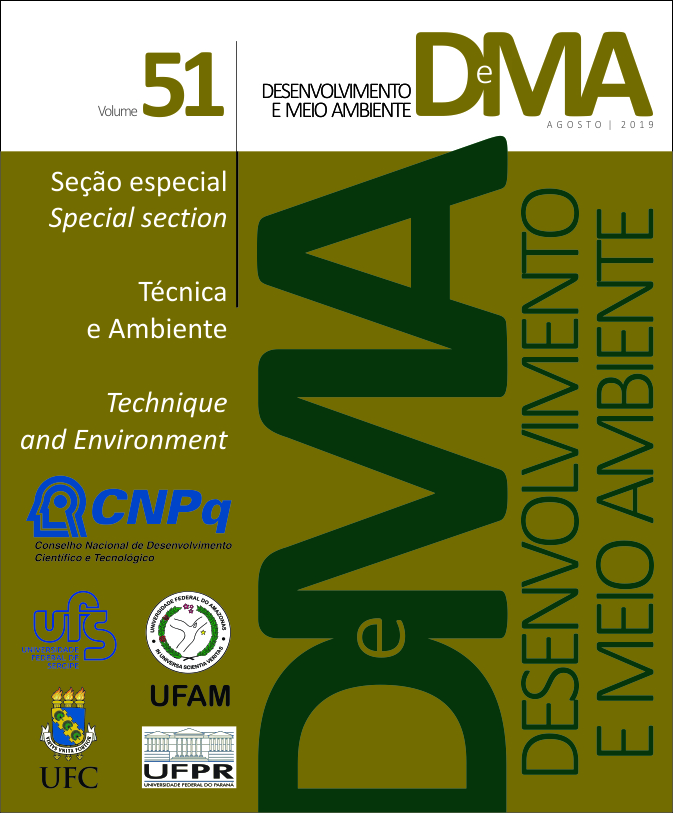A ecomotricidade na apreensão da natureza: inter-ação como experiência lúdica e ecológica
DOI:
https://doi.org/10.5380/dma.v51i0.63007Palavras-chave:
meio ambiente, fenomenologia do corpo, técnica, lúdico, estéticaResumo
Desdobrando-se sobre a compreensão de que as concepções de ambiente são construídas a partir das experiências de movimento (motricidade), o presente artigo foca na ecomotricidade, compreendida como a inter-ação lúdica e ecológica com a natureza. Dessa forma, o objetivo do artigo é conceituar e contextualizar horizontes da natureza apreendidos a partir de experiências lúdicas (significadas pela alegria/prazer) na natureza, especialmente na medida em que se evidenciam processos de incorporação (naturalização) de preceitos ecosomaestéticos-ambientalmente éticos-ecopolíticos no habitus de movimento. As inferências sobre o tema são contextualizadas a partir de dados coletados em um projeto de pesquisa sobre a ecomotricidade no estado de Sergipe (2014-2017), no qual diferentes métodos (entrevistas; observações diretas em etnografias em movimento; narrativas diversificadas; análise de perfis sociais; análises linguísticas) foram utilizados para compreender as intencionalidades de inter-ação com o meio de indivíduos com vivências lúdicas regulares na natureza, assim como as relações e visões de mundo são (re)construídas a partir dessas vivências. A partir dessa perspectiva analítica, a discussão foca a ecomotricidade na apreensão da natureza, perspectiva específica no âmbito mais amplo das discussões sobre relações ser humano (sociedade)-natureza (mundo), pela qual vislumbra-se considerações do movimento imanente de humanos-e-não-humanos-sendo-com-a-natureza, em oposição a uma visão antropocêntrica de “conexão à natureza”. Entre os principais resultados da pesquisa apresentada, discute-se como os elementos “tempo” e “imersão” se destacam na macroanálise sobre a apreensão de horizontes da natureza a partir da ecomotricidade, sendo também apresentada uma síntese crítica como princípios possivelmente transferíveis (não generalizáveis) da ecomotricidade, vislumbrando contribuir para o debate sobre possibilidades e limitações da incorporação de preceitos ecológicos no habitus de movimento de indivíduos a partir de experiências lúdicas na natureza.
Downloads
Publicado
Como Citar
Edição
Seção
Licença
Os Direitos Autorais sobre trabalhos publicados nesta revista são do autor, com direitos de primeira publicação para a revista. O conteúdo dos trabalhos publicados é de inteira responsabilidade dos autores. A DMA é um periódico de acesso aberto (open access), e adota a licença Creative Commons Atribuição 4.0 Não Adaptada (CC-BY), desde janeiro de 2023. Portanto, ao serem publicados por esta Revista, os artigos são de livre uso para compartilhar (copiar e redistribuir o material em qualquer suporte ou formato para qualquer fim, mesmo que comercial) e adaptar (remixar, transformar, e criar a partir do material para qualquer fim, mesmo que comercial). É preciso dar o crédito apropriado, prover um link para a licença e indicar se mudanças foram feitas.
Os conteúdos publicados pela DMA do v. 53 de 2020 ao v. 60 de 2022 são protegidos pela licença Creative Commons Atribuição – Não Comercial – Sem Derivações 4.0 Internacional.
A DMA é uma revista de acesso aberto desde a sua criação, entretanto, do v.1 de 2000 ao v. 52 de 2019, o periódico não adotava uma licença Creative Commons e, portanto, o tipo de licença não é indicado na página inicial dos artigos.




